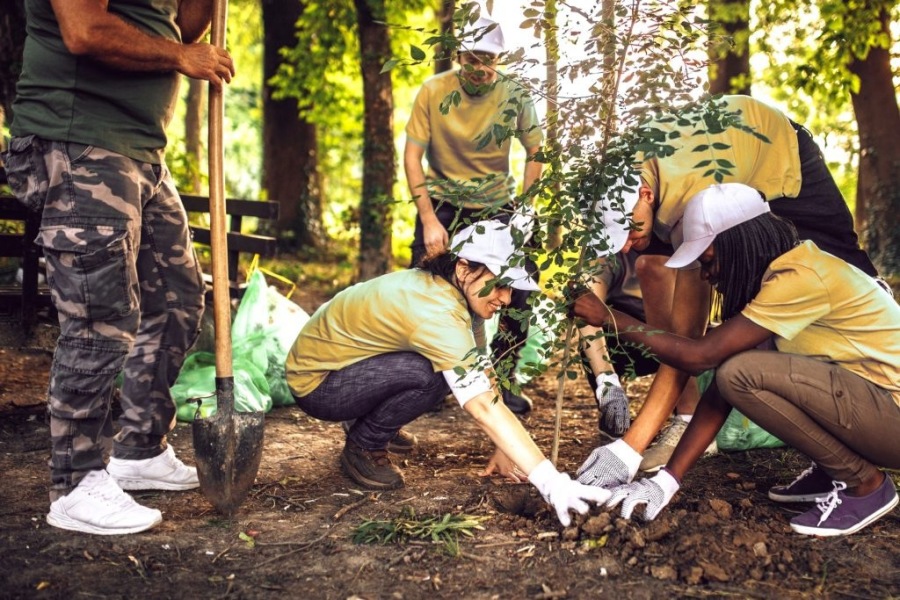It’s About Power With…Not Power Over

Jim Prince, a Tennessee businessman, succumbed to cancer in November 1998. As he fought the cancer over the course of many years, he came to realize that he “…had never done anything to benefit future generations.” He eventually decided to leave 513 acres of prime hiking land to outdoor enthusiasts, keeping it out of the hands of land developers. Broke from his soaring medical bills, he mortgaged his house and borrowed the money to purchase the land.
After six months of lobbying with the support of outdoor associations, Prince persuaded the State of Tennessee to purchase the 513 acres and turn it into a recreational park. Soon after, he lost his voice to throat surgery, and not long after that Prince died. His spirit, however, lives on. He is quoted as once saying: “There’s no limit to what you can do as long as you don’t worry about who gets the credit.” (As told by Russell Gerbman in Backpacker, June 1999).
This story speaks to the need for organizational leaders to work in the spirit of what’s best for their customers, stakeholders and co-workers. The same applies to leaders at all levels. It’s about collaboration and focusing on the organization’s mission, supported by its values. And in a world that’s being wracked by a pandemic—Covid-19—it’s impressive to watch people and companies step up to donate time, effort and money to a common cause. Trying to claim credit doesn’t appear to be anyone’s motive.
This is a dramatic change of reference from the traditional practice of top-down decision-making. It’s about power with, not power over.
Think about a situation where your manager gave the credit and glory to you and your co-workers. How did you feel? Think of a situation where your manager retained the praise and credit for himself or herself? How did you feel?
The concept of collaboration based on power with brings to mind my volunteer experience with the Canadian Red Cross in the late nineties. In the spring of 1999 I assisted with the arrival of Kosovar refugees at Canadian Forces Base Gagetown in New Brunswick. It was a powerful experience.
What was intriguing at CFB Gagetown, and other military bases where the refugees were housed, was the sense of community that quickly developed. The refugee groups at each base formed informal councils where issues were discussed (e.g., language training, schooling for the children, cultural needs and recreation). Spokespeople were identified so their concerns could be brought to the appropriate agency on the base. Despite what these people had gone through in Kosovo, they recognized the need to form a community in a strange land.
What was so compelling about this experience is that it speaks to the concept of power with. Although the Kosovars on the military bases had certain rules to follow, they took the initiative to share power so that they maintained some sense of dignity and control over their lives.

The same can be said for organizations. It’s not just an issue for senior management to relinquish control and to share power with employees. Employees must also demand it. They must take that first step—that leap of faith—towards assuming more responsibility in the decision-making process. However, with that increased power comes accountability.
The issue of sharing power and empowerment has an inherent dilemma. Managers talk of empowering their people yet cling to power. People want to play a greater part in making decisions and assuming more responsibility, but they often resist the accountability that accompanies this. While these are generalizations, they do speak to the opposing tension that’s prevalent in the debate on empowerment.
During the same period I was doing volunteer work with the Red Cross, along with working for the federal government, I was also doing a Masters degree in leadership and organizational learning at Royal Roads University in British Columbia. It was in my second summer residency that I met a profound Canadian leader. Dr. Alfred Taiaiake (author of Peace, Power, Righteousness and Director of the Indigenous Governance program at the University of Victoria in British Columbia) spoke to my peers on the need for First Nations communities to take charge of their destinies. As he writes in his book:
Leadership is exercised by persuading individuals to pool their self-power in the interest of the collective good. By contrast, in the European tradition power is surrendered to the representatives of the majority, whose decisions on what they think is the collective good are then imposed on all citizens….The indigenous tradition is profoundly egalitarian; it does not put any substantial distance between leaders and other people, let alone allow for the exercise of coercive authority….The lesson of the past is that indigenous people have less to fear by moving away from colonialism than by remaining bound by it; in their resistance, they demonstrate an inner strength greater than that of the nations that would dominate them.

What can we learn from Dr. Alfred’s comments?
How can we inspire employees so that they make the decision to empower themselves?
As leadership practitioner Harrison Owen has stated: “If I empower you to some extent you are still within my power.”
The word “empowerment” has been badly abused for decades, both in the literature and in organizations. When I worked post-retirement part-time for a large US-based home improvement chain the word “empowerment” was tossed around like candy at employee town halls and in corporate training. It was horribly abused by the federal government where I worked for three decades.
So how do we come to grips with empowerment and learn how to share power?
It begins with stepping back and allowing ourselves to align what we say with what we actually do.
Max DePree in his second book Leadership Jazz recounts the powerful learning experience he went through with the birth of his granddaughter, Zoe. She was a premature baby, weighing one pound, seven ounces. Zoe was so tiny that DePree could slide his wedding ring up to her shoulder. Because DePree’s daughter had been abandoned by Zoe’s biological father, the neonatal nurse, Ruth, asked Depree to take on a special role. Whenever he visited Zoe, he was to rub her little body with the tip of his finger and tell her how much he loved her. It was important, Ruth told him, that Zoe be able to connect DePree’s voice with his touch.
DePree notes: “Ruth was doing exactly the right thing on Zoe’s behalf (and of course, on my behalf as well), and without realizing it she was giving me one of the best possible descriptions of the work of a leader. At the core of becoming a leader is the need always to connect one’s voice and one’s touch.”
Take a moment to reflect on this powerful story shared by DePree.
Do you as a leader, in whatever formal or informal role you hold, connect your voice with your touch?
Letting go and learning how to share power doesn’t come easily to many of us. What IS important is that we take that first tentative step towards Power With.
Let’s get started.
The more power you give away, the more you have.
– Frances Hesselbein
Articles from Jim Taggart
View blog
In my last post I talked about building team performance. Today, we look at what kind of team player ...

The leadership field—and its cousin management—has an over abundance of information, from books, per ...

Today, we’ll look at the four stages of team development and incorporate the four team player styles ...
You may be interested in these jobs
-
landscape labourer
Found in: Talent CA 2 C2 - 13 hours ago
Cap-City Landscaping Inc Sherwood Park, CanadaEducation: No degree, certificate or diploma · Experience: Will train · Tasks · Assist with landscape constructions · Tie and secure plants · Weed, prune and trim trees and plants · Cut grass · Rake and collect refuse · Remove litter and garbage · Cart and spread topsoil and othe ...
-
construction carpenter
Found in: Talent CA 2 C2 - 3 days ago
Antigo Construction Company Limited Mississauga, CanadaWork Term: Permanent · Work Language: English · Hours: 30 hours per week · Education: Secondary (high) school graduation certificate · Experience: 1 year to less than 2 years · Asset languages · Hindi · Urdu · Panjabi; Punjabi · Work site environment · Confined spaces · Noisy · D ...
-
Human Resources Business Partner l
Found in: Talent CA C2 - 1 day ago
Innomar Strategies Ontario, Canada Full timeOur team members are at the heart of everything we do. At Cencora, we are united in our responsibility to create healthier futures, and every person here is essential to us being able to deliver on that purpose. If you want to make a difference at the center of health, come join ...



Comments